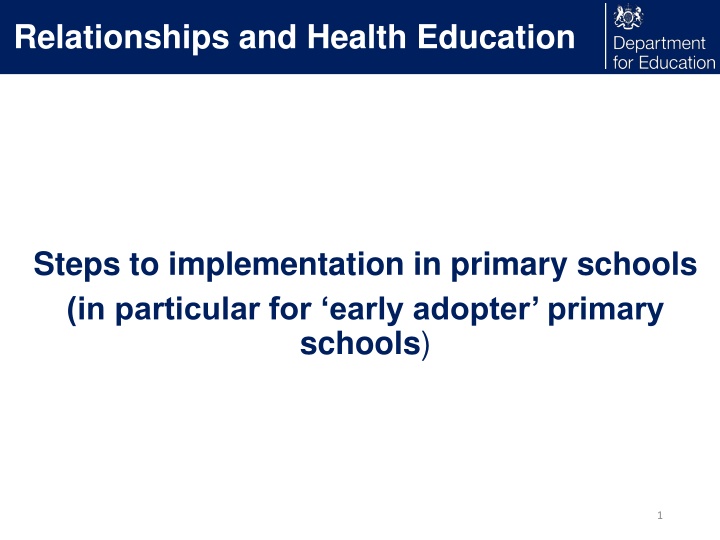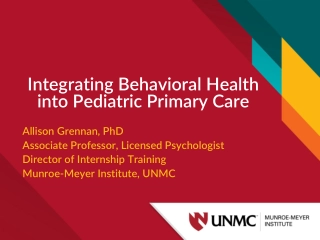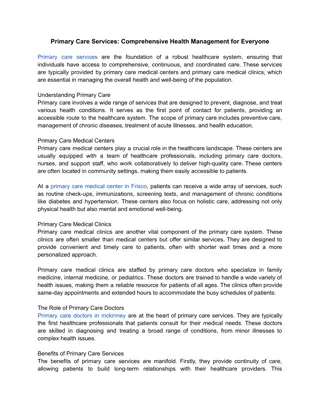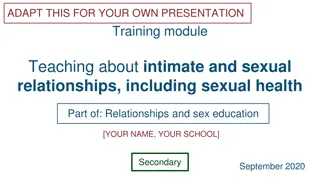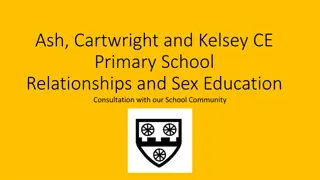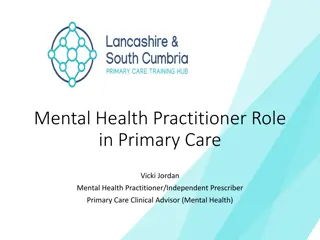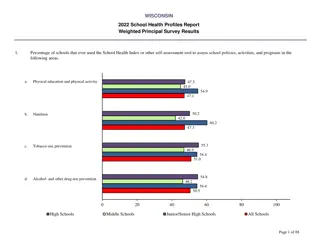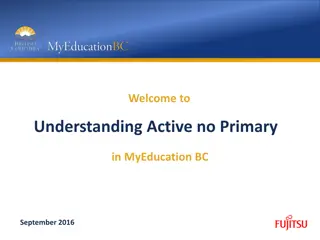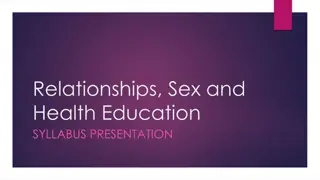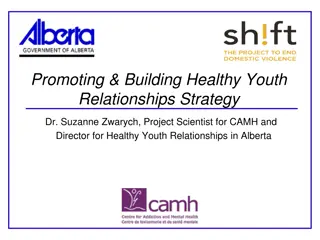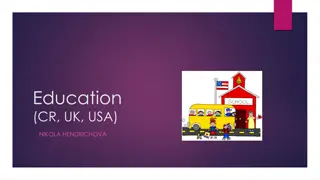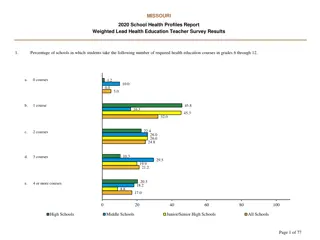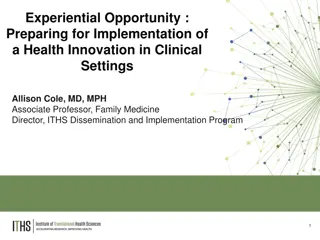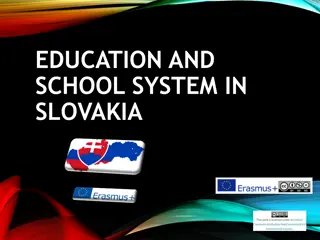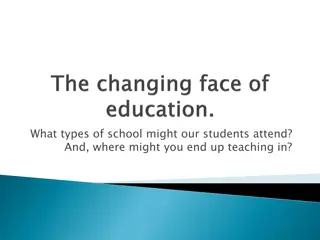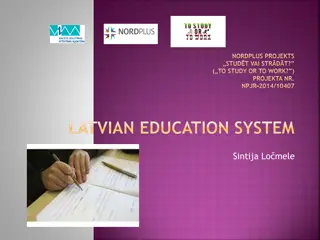Implementation Steps for Relationships and Health Education in Primary Schools
Statutory guidance and support for implementing Relationships and Health Education in primary schools, covering basics, integration into school ethos, and policy requirements. Essential information for headteachers, teachers, and school staff.
Download Presentation

Please find below an Image/Link to download the presentation.
The content on the website is provided AS IS for your information and personal use only. It may not be sold, licensed, or shared on other websites without obtaining consent from the author.If you encounter any issues during the download, it is possible that the publisher has removed the file from their server.
You are allowed to download the files provided on this website for personal or commercial use, subject to the condition that they are used lawfully. All files are the property of their respective owners.
The content on the website is provided AS IS for your information and personal use only. It may not be sold, licensed, or shared on other websites without obtaining consent from the author.
E N D
Presentation Transcript
Relationships and Health Education Steps to implementation in primary schools (in particular for early adopter primary schools) 1
Statutory guidance and wider support Head teachers and teachers must read the statutory guidance in full before using the slides The intended audience for the slides are headteachers, teachers, governors or other school staff The slides are designed to be used and adapted for a staff meeting for example Schools will want to adapt or redraft examples / scripts to suit their school and their own ethos. Schools are also free to take a different approach the slides are intended to provide some suggestions These implementation slides will be complemented by further materials and information to support schools this is one strand of support PRIMARY 2
Basics Implementation of Relationships Education is compulsory from September 2020 in all schools teaching primary aged children, state and independent Implementation of Health Education is compulsory from September 2020 in all state funded schools teaching primary aged children (effectively compulsory for all since PSHE is already compulsory for pupils at independent schools which are not academies) Sex education is not compulsory in any primary school, but may be taught if the school chooses, having regard to the statutory Relationships, Sex and Health Education guidance. It is important to be aware that the existing legislation and Sex and Relationships Education Guidance (2000) will continue to apply until September 2020, when the new legislation and guidance will take effect, but preparation for the reforms should start now. PRIMARY 3
Integration to whole school ethos Schools should have a statement of values and ethos anyway, and may include personal qualities it seeks to foster Relationships and Health Education should link to or be referenced in that statement e.g. as a school we value diversity and foster mutual respect, modelling and inspiring attributes in pupils such as respect, courtesy and honesty. These underpin and inform the relationships we have, between pupils and between adults and pupils Where a school has a specific religious ethos, this will normally be referenced in the ethos statement and may be alongside a reference to the importance of respect for others in society PRIMARY 4
Policies All schools must have a policy in place Policies are typically approved by governors You will need to have decided the outline of your teaching programme before finalising the policy Possible headings are included in the statutory guidance but you may include: What topics are taught at primary, and in which terms and years How the programme is taught (class teachers, visiting speakers, assemblies etc) How religious backgrounds of pupils are taken into account How off script questions from pupils will be handled Whether sex education is taught if so, clarity for parents on right to withdraw How the policy is produced, including any consultation with parents Reference to any requirements on schools in law e.g. the Equality Act When policy updated and who approves (e.g. governing body etc) You may wish to include how you will ensure appropriate access for pupils with SEND or how you might approach teaching about LGBT relationships in the context of family, for example PRIMARY 5
Planning for implementation The early adopter programme is entirely voluntary so there is no requirement to teach more than the school feels it has the capacity to teach in academic year 2019-20 From September 2020 the Statutory Guidance becomes a requirement and will apply to all schools in all the relevant year groups However, it is well understood that this will take some time to embed For example, where content has not previously been taught, there may be less foundational knowledge among older pupils than once the programme has run its full cycle Schools will need to make pragmatic and sensible decisions in the initial phase of its implementation, for example through prioritising the most important knowledge for older pupils who have not covered material now being taught to younger pupils PRIMARY 6
What does age-appropriate mean? The Statutory Guidance gives content for primary and secondary, but not by key stage or year This is because the age and developmentally appropriate judgement will vary by school and context Considerations might include for example: what pupils are likely to need to know (including any safeguarding considerations) what they are likely to be able to understand PRIMARY 7
Engaging parents Once you have prepared your programme and drafted your policy, consider offering a parents and carers event to inform, reassure, listen and discuss Set out your approach to the subjects fully and clearly Consider the topics or areas you think parents may be interested in or have questions about (if you are choosing to teach sex education* it is likely to include that); also may include puberty, how you take account of religious backgrounds in teaching, teaching about different types of family, safeguarding, online information etc Ideally, show parents the resources you will use and walk them through some sequences of teaching Listen to feedback sensitively and where appropriate feed into your planning or teaching approaches However, consultation with and listening sensitively to the views of parents does not mean that parents have a right of veto for topics set out in the Statutory Guidance, or when schools judge that it is appropriate to teach them The Department will provide more advice to support effective engagement with parents. This will be reflected in our school support package and we are also developing a document for schools to help with this and highlight good practice. We have also produced guides for parents for schools to use this gives a summary of the subjects. *optional at primary PRIMARY 8
Who is responsible? Governing body (or trust board, or proprietor) Headteacher There may be a coordinator to oversee planning, identify resources, support drafting of policy and liaison with parents, check any visiting speakers Class teachers Once the school s policy has been approved, and where that policy includes a year by year breakdown of topics plus a summary of the school s approach to sensitive issues, that is what teachers are required to implement Where parents have complaints about that approach which cannot be resolved through informal discussion then they should follow the school s (curriculum) complaints policy PRIMARY 9
Status of PSHE The requirement is that schools should have regard to the new Statutory Guidance for Relationships and Sex Education and Health Education If they wish to include this statutory content in an existing PSHE programme, and teach it alongside other non-statutory content, they are free to do so, having regard to the Statutory Guidance. PSHE remains non-statutory in maintained schools although the new subjects cover much of the content typically included in a PSHE programme. PSHE continues to be compulsory in independent schools. The DfE continues to encourage schools to continue with this model of PSHE or similar programme, where it continues to meet the requirements of the high level framework in the statutory Relationships, Sex and Health Education guidance. It would be good practice to ensure the content of existing programmes is audited before September 2020 to ensure that all aspects of the new statutory content are, in fact, included Schools may equally adopt other curricular models It is important to be aware that the existing legislation and Sex and Relationships Education Guidance (2000) will continue to apply until September 2020, when the new legislation and guidance will take effect. As has always been the case, schools must have regard to the current guidance where they include SRE as part of their PSHE programme and this includes for example, a parental right to withdraw from Sex Education, as set out in legislation. There is no right to withdraw from Sex Education delivered as part of the national curriculum for science. PRIMARY 10
Pedagogy Be clear about your approach to pedagogy and connect to wider school approaches In general, what we know about how children are best taught applies to these subjects as to all others Resources produced by others may imply an approach to pedagogy which does not match the evidence or does not match your school s overall approach be aware of that and adapt accordingly Teaching should clearly explain the knowledge and concepts needed, and provide adequate opportunities for pupils to practise and apply knowledge and concepts so that they are embedded in the long term memory and build towards a coherent understanding of the topic A good summary of what we know about effective pedagogy and how to apply it is in the Early Career Framework published by the DfE PRIMARY 11
Pedagogy: from the Early Career Framework Deliver a carefully sequenced and coherent curriculum, by: Identifying essential concepts, knowledge, skills and principles of the subject and providing opportunity for all pupils to learn and master these critical components Ensuring pupils thinking is focused on key ideas within the subject Working with experienced colleagues to accumulate and refine a collection of powerful analogies, illustrations, examples, explanations and demonstrations Using resources and materials aligned with the school curriculum (e.g. textbooks or shared resources designed by experienced colleagues that carefully sequence content) Being aware of common misconceptions and discussing with experienced colleagues how to help pupils master important concepts from the Early Career Framework PRIMARY 12
Planning your programme Relationships Education, RSE and Health Education complement several national curriculum subjects Where schools are teaching the national curriculum, they should look for opportunities to draw links between the subjects and integrate teaching where appropriate There continues to be no right of withdrawal from any part of the national curriculum PRIMARY 13
Planning your programme: Relationships Planning your programme of teaching for Relationships Education - topics Families and people who care for me Caring friendships Respectful relationships Online relationships Being safe PRIMARY 14
Planning your programme: Health Planning your programme of teaching for Health Education - topics Mental well-being Internet safety and harms Physical health and fitness Healthy eating Drugs, alcohol and tobacco Health and prevention Basic first aid Changing adolescent body PRIMARY 15
Planning your programme: organisation Options could include regular lessons for example weekly or fortnightly slot in class taught by class teacher A teacher or other appropriate adult in school who teaches a particular topic to all classes in turn Whole school / key stage assemblies, either led by staff at school or by a carefully selected external speaker or expert Map out terms, years and key stages and decide which topics you will cover when Some topics are likely to be suitable for KS2 or later KS2 Other topics are relevant at all stages so may need to be covered two or three times (e.g. year 1, year 3, year 5; or year 2 and year 4 etc) or in some cases very frequently (e.g. core concepts about friends and families) Don t overlook basic socialisation you do anyway as a contributor to aspects of Relationships Education e.g. turn-taking, listening to others views, being polite, holding doors for others etc try to capture these as you plan PRIMARY 16
Families and people who care for me (example) that families are important for children growing up because they can give love, security and stability , the characteristics of healthy family life, commitment to each other, including in times of difficulty, protection and care for children and other family members, the importance of spending time together and sharing each other s lives. Example core knowledge KS1: extension of knowledge about own family to family as a wider social unit; knowledge of a range of emotions and interactions which can be found in families; knowing names of different extended family relatives; knowing that some children have no families Example pedagogical approaches in KS1: pupils will learn about families through a range of stories which both tell of different family experiences, including where challenges have been overcome, and at the same time will build domain specific vocabulary teacher explanation will illustrate and expand pupils knowledge of families PRIMARY 17
Families and people who care for me (example) that others families, either in school or in the wider world, sometimes look different from their family, but that they should respect those differences and know that other children s families are also characterised by love and care. that stable, caring relationships, which may be of different types, are at the heart of happy families, and are important for children s security as they grow up. Example core knowledge in KS2: pupils know that some families consist of two parents, or of one parent only, or of foster parents, or same sex parents, or grandparents; virtue of respect despite difference; risks of discrimination or bullying when children come from different types of family; know that children, and people more generally, depend on love and care, and know the behavioural and emotional consequences of lack of family love Example pedagogical approaches in KS2: stories containing different family types presented positively; teaching about respect expanding meaning of the concept and its application in different contexts; if possible assemblies with carefully prepared personal stories from adults whose childhoods were disrupted and have overcome challenges this brought PRIMARY 18
Families and people who care for me (example) that marriage1 represents a formal and legally recognised commitment of two people to each other which is intended to be lifelong. how to recognise if family relationships are making them feel unhappy or unsafe, and how to seek help or advice from others if needed. Example core knowledge KS2: definition of marriage in different cultures and under British law; a number of specific examples of healthy family relationships; where to go for emotional help or support as a child Example pedagogical approaches KS2: direct teaching of features of marriage and different marriage traditions; explain marriage vows and their meaning, along with knowledge about vows and promises more generally; possibly personal testimonies in assemblies from married people about why they married and what it brings them; awareness of avenues for seeking help in school or beyond; explanation of how confidentiality works in such cases 1Marriage in England and Wales is available to both opposite sex and same sex couples. The Marriage (Same Sex Couples) Act 2013 extended marriage to same sex couples in England and Wales. The ceremony through which a couple get married may be civil or religious. PRIMARY 19
LGBT inclusive Statutory Guidance says schools should ensure that all of their teaching is sensitive and age appropriate in approach and content. At the point at which schools consider it appropriate to teach their pupils about LGBT, they should ensure that this content is fully integrated into their programmes of study for this area of the curriculum rather than delivered as a stand-alone unit or lesson. Schools are free to determine how they do this, and we expect all pupils to have been taught LGBT content at a timely point as part of this area of the curriculum. The statutory guidance states that all pupils should receive teaching on LGBT relationships during their school years. The guidance is clear that secondary schools should include LGBT content in their teaching Primary schools are enabled and strongly encouraged to cover LGBT content. This would be delivered, for example, through teaching about different types of family, including those with same sex parents PRIMARY 20
How some primary schools may approach this some possible examples. Primary schools often choose to teach this in the broader context of teaching about respect for all or family, e.g. Families: diversity of family types to include LGBT families; marriage/civil partnership may be between two people of same sex under British law Respectful relationships: that LGBT people (in school or more widely) may be subject to bullying or negative comments but that is wrong, how it might make them feel Online relationships: that negative or bullying comments about anyone, including LGBT people or families online are as damaging and wrong as in school or face to face Primary schools are enabled and strongly encouraged to cover LGBT content. PRIMARY 21
How some primary schools may approach this some possible examples. Different family types which could include single parents, foster parents, grandparents and same-sex parents could feature in books from KS1 or early KS2. Sometimes little discussion may be needed at this stage Early discussions in KS1 or early KS2 about the impact of bullying or importance of respecting others could include examples of children in LGBT families In KS2 pupils could be taught the basics of what marriage is, and be told that under British law people of the same sex may also marry and choose to live as a family In KS2 pupils may be taught about stereotypes, and LGBT stereotypes may be included here, along with the damaging impact of thinking about or treating people as stereotypes In KS2 pupils learn about online safety. This includes how to behave online and how to report bad behaviour this may include online harassment of people for actual or perceived sexuality or gender identity PRIMARY 22
Sensitive issues in particular contexts What is sensitive or likely to give parents or teachers cause for anxiety may vary according to the context of the school In all schools by law, the religious background of all pupils must be taken into account when planning teaching of Relationships Education This doesn t mean not teaching some issues but may mean particular care is taken over the framing of such issues, or additional time taken to ensure parents are clear about how issues are to be taught In some cases sharing and explaining teaching materials may be a good strategy; sometimes a sample teacher script may be used to give teachers and parents confidence in an approach on a specific topic Schools with a designated religious ethos may also teach their faith teachings or perspectives but should also ensure that they have regard to the statutory guidance indeed any school is free to address faith perspectives PRIMARY 23
Developing exemplars An exemplar script can be a helpful tool for teachers to rehearse how they will deliver a topic create your own exemplars as a team to suit your school and ethos Example script on puberty: As you start to grow up, your body starts to change (physical changes) and your feelings start to change (emotional changes). This is called puberty. Different people start puberty at different ages, and it can take some time for all these changes to happen. The age at which you start puberty is not important and has nothing to do with the kind of adult you will become. It is ok to have questions or worries about puberty and you can talk about anything that is on your mind with a teacher, parent or with other trusted grown-ups. PRIMARY 24
Developing exemplars An exemplar script on a sensitive issue in one context create your own exemplars as a team to suit your school and ethos Example script on LGBT and religious backgrounds: The majority of people who follow the teachings of (religion) may choose to live in families consisting of a man, woman and children. Some religious people will see this as a preferred way of living. The law in this country allows and respects the right of people to live in families such as this. However, the law also gives people the right to live in other families. You may come across families where two men or two women have chosen to live together or marry and bring up children together. That family is also allowed under the law in this country and we respect the rights of people to live in different families. If we meet children who live in different sorts of families to those we are familiar with, it is wrong to say bad things about them or to bully them. Like their parents and their families, they are entitled to the same respect as everyone else. PRIMARY 25
How does the Equality Act and PSED impact on Relationships/Health Education? Schools are required to comply with relevant requirements of the Equality Act 2010. Chapter 1 of Part 6 of the Act applies to schools. As an example, Part 6 of the Act makes it unlawful for a school to discriminate against, harass or victimise a pupil or potential pupil in relation to admissions or in how the school is run The content of the school curriculum is exempt from the duties imposed on schools by Part 6 of the Equality Act. Excluding the content of the curriculum ensures that schools are free to include a full range of issues, ideas and materials in their syllabus, and to expose pupils to thoughts and ideas of all kinds, however challenging or controversial, without fear of legal challenge based on a protected characteristic State-funded schools are required, in discharging their functions, to have due regard to the need to: eliminate discrimination, harassment, victimisation and any other conduct that is prohibited by or under the Act; and advance equality of opportunity and foster good relations between persons who share a relevant protected characteristic and persons who do not share it. Relevant protected characteristics are age, disability, gender reassignment, pregnancy and maternity, race, religion or belief, sex and sexual orientation Whilst this does not mean that schools are required to teach about the Equality Act or the protected characteristics, they many choose to do so in teaching their pupils about respect for difference and in the context of other requirements, such as promoting fundamental British values and the spiritual, moral, social and cultural development of pupils PRIMARY 26
How does the Equality Act and PSED impact on Relationships/Health Education? Section 149 of the Equality Act sets out the public sector equality duty, which applies to all state funded schools. In summary, the PSED requires such schools, in their decision-making, to have due regard to the need to: Eliminate discrimination, harassment, victimisation and any other conduct that is prohibited by or under the Equality Act Advance equality of opportunity between people who share a relevant protected characteristic and those who do not Foster good relations between people who share a relevant protected characteristic and those who do not For the purposes of the second and third bullets, relevant protected characteristics are age; disability; gender reassignment; pregnancy and maternity; race; religion or belief; sex; sexual orientation Please see the PSED, for further detail as well as the guidance for schools, Public Sector Equality Duty Guidance for Schools in England (2014) PRIMARY 27
Health Education In developing content, emphasis should be on giving pupils a strong knowledge base about health This will enable them to make good decisions for their own health now and in the future This is more effective than simply telling them what decisions to make without the underpinning knowledge Example 1 healthy eating: what the physical impacts (e.g. on weight, organ function etc) of a poor diet is; nutritional values of different foods; how to plan for balanced and healthy meals Example 2 physical health and fitness: the physical impact of exercise of different types on the body (organs, weight, muscle mass etc); how much exercise of different types needs to be undertaken to see these benefits in people of different ages; a daily routine which includes actually doing a suitable amount of physical exercise PRIMARY 28
Puberty Changing adolescent body is in Health Education Substantive content generally suitable to upper KS2 Note that girls may (occasionally) experience first period as early as year 4, so some signalling on menstruation may be needed as early as this, though generally these topics may be most suitable for years 5 and 6 Girls and boys should both know what happens to both girls and boys at puberty However, girls may sometimes have a strong preference for the practical aspects of menstruation to be explained and discussed without boys present. Consider your cohort and what works best in your school currently Very important to talk with parents both individually and collectively on this topic, and encourage parents to talk to their children at the appropriate age about puberty, especially periods for girls Schools should also consider how topics are addressed in other areas of the curriculum for example national curriculum science, to inform their planning PRIMARY 29
Handling off script questions Teaching in these subjects should allow appropriate opportunities for pupils to ask questions to check and test their understanding Most questions will be relevant to what the teacher has explained, and generally questions should be welcomed pupils should not feel penalised or censored for asking sensible or relevant questions, even if they are occasionally awkward Sometimes, pupils may ask questions which go beyond what the teacher has planned and may stray into sensitive territory There is no single way to address all such questions some may be handled straightforwardly for the whole class to hear PRIMARY 30
Handling off script questions If a question asks for personal information or personal views from the teacher, it may often be appropriate to direct the focus back to the topic and examples given. There is no obligation on the teacher to offer information personal to themselves or personal views. The focus should be on the subject matter planned and agreed for teaching by the school. This can be set out in ground rules at the start of lessons Some questions may relate to Sex Education which the school may not be teaching, or not yet. These should generally not be answered in front of the whole class Strategies include offering a word outside the lesson, referring to another more senior member of staff, offering a simple holding answer and mentioning the question to parents at the end of the day Teachers should of course be mindful that a question may occasionally raise a possible safeguarding concern, and the school s safeguarding process should be followed in such cases PRIMARY 31
Managing a sensitive class discussion Occasionally teachers may find that managing a whole class discussion is a useful stage in the teaching of a particular topic Whole class discussions can be a useful way to model listening respectfully to the views of others and turn-taking, though in a class of 30 only one person can speak at a time so these discussions should not be over-used While distancing techniques (using a third party example) can be useful in some cases for sensitive or potentially personal issues, in general, it is not helpful to invite pupils to act roles which may be controversial in such discussions it is better to allow them to ask their own genuine questions or express their own genuine views Teachers should manage and lead discussions attentively. If the discussion is at risk of straying, the teachers need to be prepared to redirect it back to intended topics remember the teacher is in charge at all times It is generally not helpful to ask pupils to lead or chair discussions on sensitive topics as there can be a greater risk of going off topic PRIMARY 32
External organisations or speakers These can be a powerful and useful way to bring expertise, resources, experience or an impactful personal story to pupils However, there are risks and doing thorough due diligence, including looking at recommendations from other schools, is important Is this person or organisation credible? Review any case study material and look for feedback from others they have worked with Be clear what they are going to say or what line they will take ask to see materials, slides, film clips, scripts etc in advance Make sure you know the named individuals who will be there, check any need for DBS and that there is an agreed protocol should any safeguarding issue arise, for example a disclosure Do a basic online search (as parents may do this) and if it throws up anything you or parents would be concerned about address this beforehand Check protocols for taking pictures or using any personal data the external speaker may get from the session Don t be afraid to say no, or in extreme cases stop a session these are your pupils and you are responsible for what is said to them It's good practice for the teacher to be in the room, so they know what was discussed and can follow up with their pupils. They will also understand what has been discussed if a pupil makes a disclosure later PRIMARY 33
Primary sex education where taught Primaries may already have age-appropriate sex education programmes in place No need to change these if they are working well and have parental buy-in However, sex education is outside the content defined for Relationships and Health Education (primary), and schools do not need to start teaching Sex Education if they do not wish to (decision ultimately is governors ) Needs to be clearly set out in policy what approach the school takes If a school covers Sex Education content which goes beyond that set out for either Relationships or Health Education, be aware of the parental right of withdrawal at primary make clear to parents in policy, and set out a practical method for parents to communicate to school, if this is their wish Stating clearly exactly what aspects of Sex Education are covered in what terms and years is helpful to allow parents to make this decision PRIMARY 34
Discussion: relationships or sex education? These two subjects are now on a different legal footing so it is important to establish how to identify each for planning and teaching purposes. Sex education is not compulsory in any primary school, but may be taught if the school chooses having regard to the statutory Relationships, Sex and Health Education guidance. Discuss these examples and agree how you would approach in your school and engage parents in this: Learning about different kinds of families Learning that some families may have two male or two female parents Learning that homophobic bullying or discrimination is wrong and must be reported if it occurs Learning that at puberty adolescents emotional feelings for others can change and we can feel attracted to others in a physical way Learning that for some people that attraction is to others of the same sex Learning what menstruation is and its physical and emotional effects Learning how conception takes place in humans Learning about STIs PRIMARY 35
Discussion: relationships or sex education? Primaries are not required to teach Sex Education but must teach Relationships Education and have regard to the statutory guidance in full It can be useful for primary schools to look at secondary content in the Guidance when considering this question Everything defined in the content for Relationships Education, Health Education and NC KS2 Science does not carry a parental right to withdrawal If primary schools policy is to teach some aspects of Sex Education, for example points set out in the secondary content, they should clearly set this out in policy and give parents a right to withdraw However, it is always good practice to work with, inform and reassure parents even if content does not carry the right to withdraw PRIMARY 36
Training needs Governors need to know their responsibilities and duties, need briefing Headteacher and coordinator need to have read the Statutory Guidance Teachers need to have read the school policy Primary teachers already teach all (most) subjects need to be confident on the content identified for teaching but no requirement for expertise beyond that Teachers ideally need to have explored together and agreed approach to teaching / discussing / fielding questions on sensitive issues ideally practise (parts of) lessons with each other to fine tune approach and give feedback to each other On particularly knowledge rich topics e.g. internet and some aspects of health education, planning and resources should be from reliable sources so pupils are not inadvertently given misleading facts, and teachers be guided by that knowledge For some topics carefully selected external experts are a possible solution Draw on evidence and best practice subject associations often provide good summaries to support this PRIMARY 37
Assessment and evaluation Questioning and assessment in class has two functions: The act of remembering and applying to new situations helps to embed and secure knowledge and concepts in pupils long term memories (definition of learning is a change in the long term memory ) Their answers to questions shapes teachers planning in that lesson and in short and medium term, as it reveals how much is being understood and what needs re-teaching While quizzes and knowledge checks may be useful feedback and identify what knowledge has been securely retained by pupils, emphasis in this subject is on quality provision Reporting to parents may reference topics covered and the approach, attitude and confidence of the pupil in lessons PRIMARY 38
Ofsted: Personal development judgement Inspectors will evaluate the extent to which: the curriculum extends beyond the academic and provides for pupils broader development, enabling them to develop and discover their interests and talents the curriculum and the school s wider work support pupils to develop their character including their resilience, confidence and independence and help them know how to keep physically and mentally healthy at each stage of education the school prepares pupils for future success in their next steps PRIMARY 39
Ofsted: Personal development judgement High level summary Inspectors will also evaluate the extent to which: the school prepares pupils for life in modern Britain by equipping them to be responsible, respectful, active citizens who contribute positively to society developing their understanding of fundamental British values developing their understanding and appreciation of diversity celebrating what we have in common and promoting respect for the different protected characteristics as defined in law how curriculum areas such as personal, social, health and economic education, and relationship and sex education contribute to pupils personal development provision rather than impact PRIMARY 40
Statutory and non-statutory guidance Statutory Relationships Education, Relationships and Sex Education and Health Education guidance schools will be required to have regard to this from September 2020 Current SRE (2000) guidance schools can teach to the new subjects but must continue to have regard to the SRE guidance until September 2020. Guides for parents and FAQs Teaching online safety in schools - new non-statutory guidance which aims to support schools in teaching pupils how to stay safe online within new and existing school subjects, such as Relationships Education, Relationships and Sex Education, Health Education, Citizenship and Computing. PRIMARY 41
